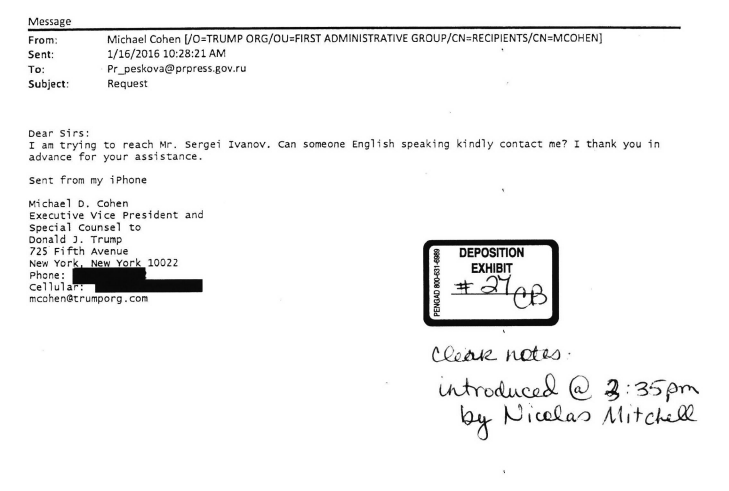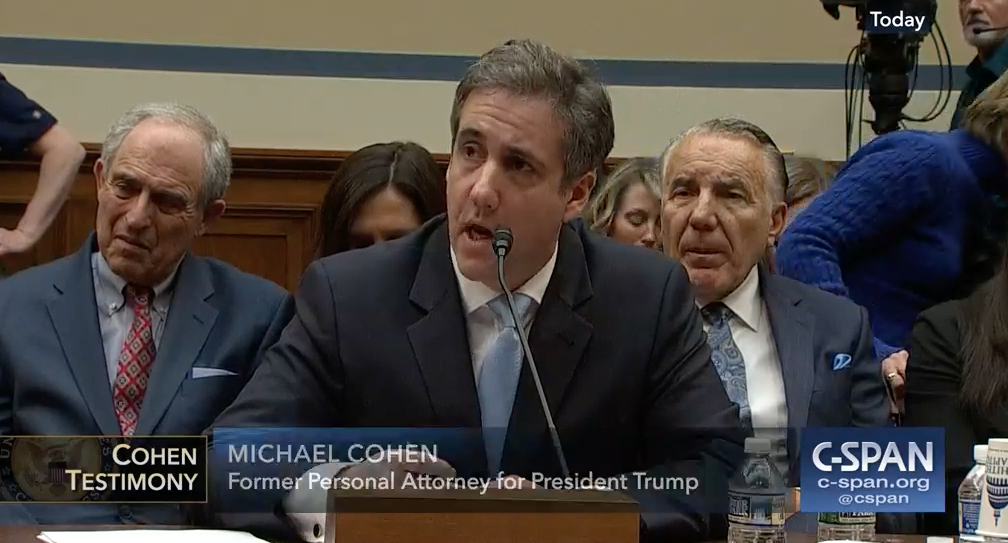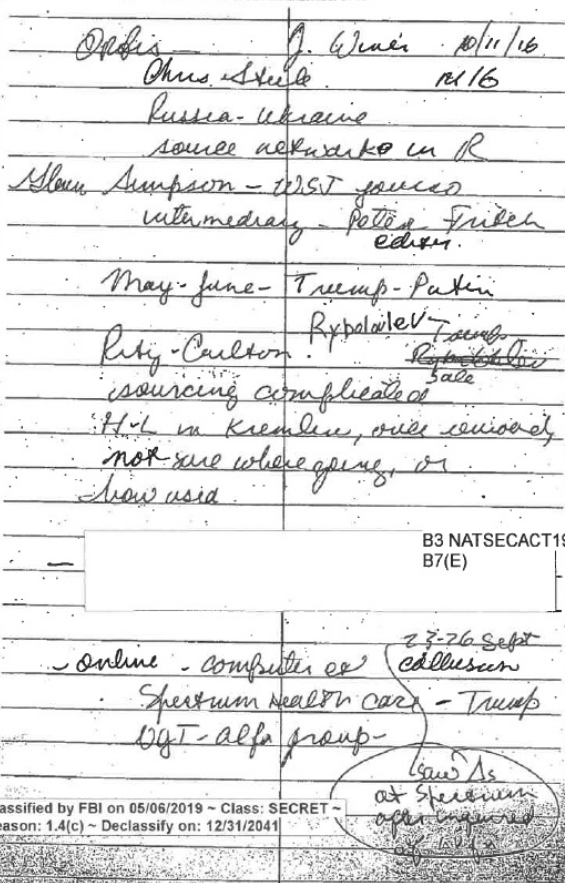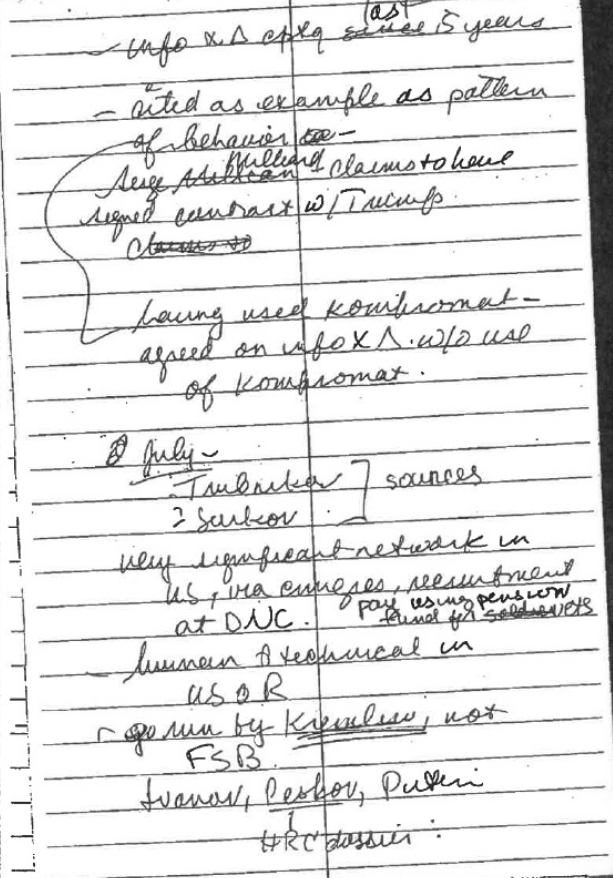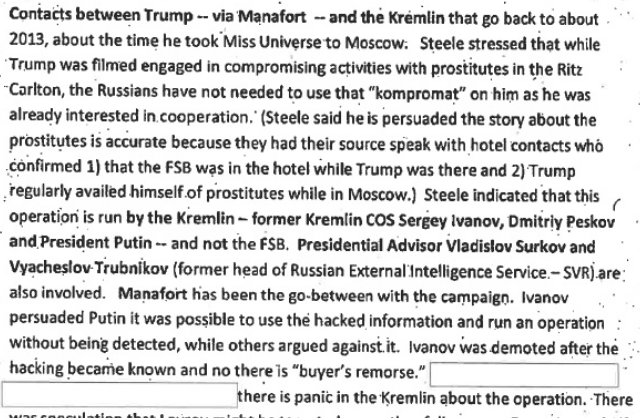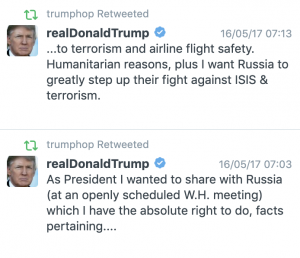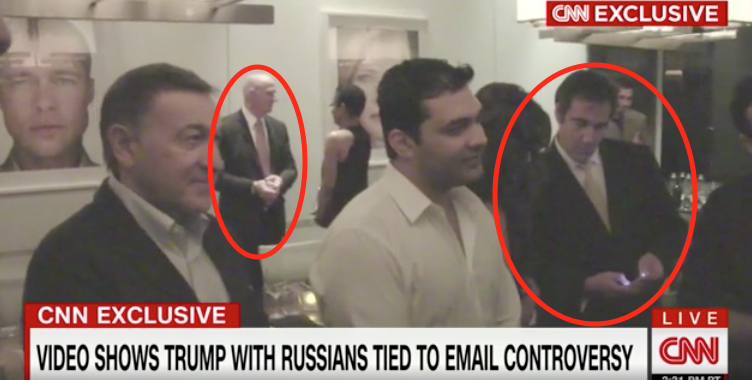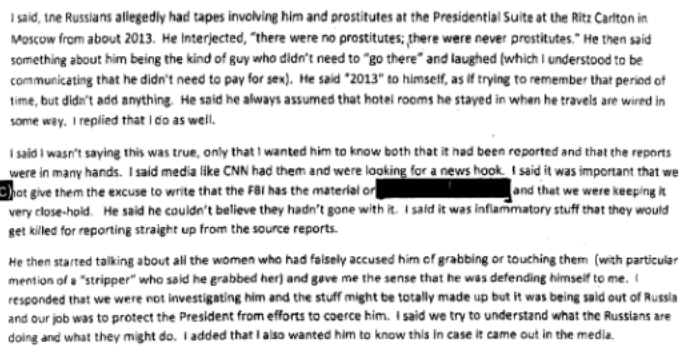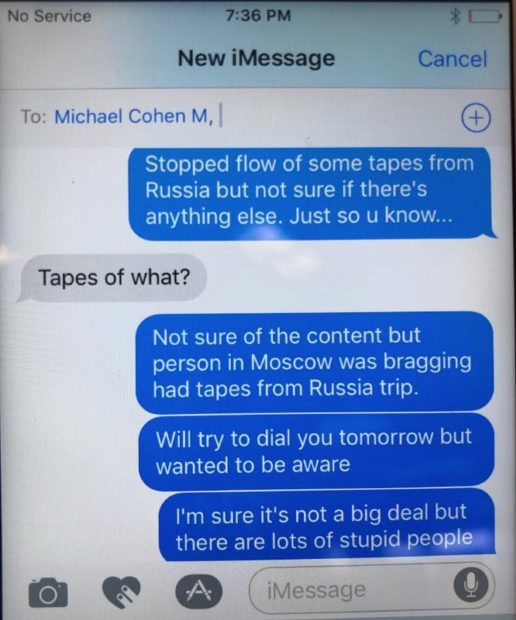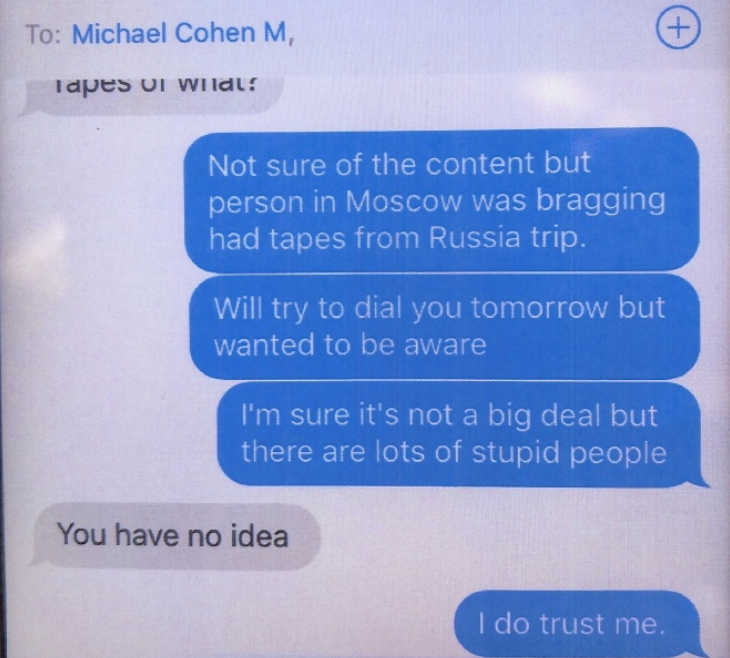Bill Barr’s Bullshit Claim that Trump Obstructed the Investigation Out of Frustration and Anger
I’ve grown increasingly bothered by the justification William Barr made for Trump’s obstruction of the Russian investigation. Basically, the Attorney General of the United States argued that because the President was “frustrated and angered” about the investigation into the Russian ties he kept lying about, his obstruction was not corrupt.
In assessing the President’s actions discussed in the report, it is important to bear in mind the context. President Trump faced an unprecedented situation. As he entered into office, and sought to perform his responsibilities as President, [1] federal agents and prosecutors were scrutinizing his conduct before and after taking office, and the conduct of some of his associates. At the same time, there was relentless speculation in the news media about the President’s personal culpability. Yet, as he said from the beginning, [2] there was in fact no collusion. And as the Special Counsel’s report acknowledges, there is substantial evidence to show that the President was frustrated and angered by a sincere belief that the investigation was undermining his presidency, [3] propelled by his political opponents, and [4] fueled by illegal leaks. Nonetheless, [5] the White House fully cooperated with the Special Counsel’s investigation, providing unfettered access to campaign and White House documents, [6] directing senior aides to testify freely, and asserting no privilege claims. And at the same time, [7] the President took no act that in fact deprived the Special Counsel of the documents and witnesses necessary to complete his investigation. Apart from whether the acts were obstructive, this evidence of non-corrupt motives weighs heavily against any allegation that the President had a corrupt intent to obstruct the investigation.
There are, of course, a slew of errors in this passage, which I address by number.
- Federal Agents and prosecutors weren’t investigating the President until after he had committed several acts of obstruction
- The report doesn’t address collusion, it addresses a criminal conspiracy; Roger Stone’s actions, done at the behest of Trump, probably reach any measure for “collusion”
- There’s no evidence that the Steele dossier drove the FBI investigation — and certainly not the Mueller investigation that Trump obstructed
- The only leak that had a substantial effect on this investigation was the one about Flynn being picked on Sergei Kislyak’s FISA intercept, but it may not have been illegal (if John Brennan authorized the leak, for example, it would have been done with the consent of an original classification authority), and Flynn’s actions would have been included as part of the already-predicated counterintelligence investigation into him in any case
- Trump personally refused to cooperate with the investigation; his responses to Mueller’s questions are outright contemptuous
- Trump knew several of his aides were lying and encouraged that
- Trump was probably involved in withholding key emails about the Moscow Trump Tower project and probably had a role in attempts to withhold Transition emails possessed by GSA
But the thing that has really begun to irk me is the Attorney General’s claim that, “as the Special Counsel’s report acknowledges, there is substantial evidence to show that the President was frustrated and angered by a sincere belief that the investigation was undermining his presidency,” which is the core of Barr’s excuse for the President’s obstructive acts: the President was frustrated and so it’s cool that he totally undermined rule of law.
Barr is largely wrong about what the report says about the President’s anger and frustration, though, and to the extent he’s not, he’s basically arguing it’s cool for the President to be angry that the system worked as it should.
To show how much he exaggerates that, I reviewed below what the Mueller Report says about the President’s:
- Frustrations
- Anger
- Motivations for obstructing the investigation
There are several categories of references that are on-point to Trump’s feelings about the investigation. In the two most persistent cases, Trump was angry that people engaged in ethical behavior. He was angry and frustrated that Jeff Sessions followed ethics guidelines and recused from the investigation. He was angry that Comey adhered to DOJ guidelines (both general and specific with respect to this investigation) about confirming or denying targets of an investigation (though the report also describes Trump denying he was angry). So one category of evidence that shows Trump was angry or frustrated — which the Attorney General claims justifies his obstruction — involves Trump reacting emotionally because people did the ethically correct thing.
In one case, he was angry that his administration got caught doing something improper. Trump was angry that Mike Flynn’s totally inappropriate secret efforts to undermine Obama’s policy towards Russia got exposed. He also was angry at Flynn for other reasons, though. Yes, Trump may be right to be angry if this was illegally leaked (something that hasn’t yet been proven), but ultimately he’s pissed that he got caught doing something wrong.
In the sections that deal with Trump’s motives for obstructive acts, the report describes what might be described as frustration about two things. First, that the focus on Russia (both the investigation and the press coverage of it) delegitimized his victory. If Barr thinks this justifies obstruction of justice, it suggests that he thinks Trump is entitled — after having cheered Russia’s hacks of his opponent — not to have it reflect on his own victory. Effectively, the Attorney General seems to think Trump should be able to benefit from help from a foreign adversary — with his encouragement!! — and then have no one mention that, which is an alarming prospect.
The report also describes how Trump was frustrated that he was stymied in foreign policy, most especially in his desire to work with Russia, by the focus on the Russian investigation. This is particularly interesting, as some of the policies Trump was thwarted in pursuing — reversing sanctions on Russia — might have been proof of a quid pro quo (remember, Trump refused to answer all questions about sanctions, even one covering the election period). Given the report’s silence on the most alarming interactions with Trump (such as Putin’s involvement in writing the June 9 statement), there could be more to Trump’s frustrations, which any Attorney General pretending to care about American national security should attend to. In any case, while the Constitution permits the President great leeway to set the country’s foreign policy, it does expect the President will be subject to political pressure on those decisions. That Trump is frustrated that the manner in which he won — plus his encouragement of it and his subsequent lies about it — has constrained his ability to work with Russia is not something that should justify obstruction of justice.
Some of the other descriptions of Trump’s response to the investigation describe him making false claims — denying that Russia did the hack, preferred him, and also denying he had business with Russia. That is, Trump was not denying the allegations in the dossier, but was denying other things that were, in fact, true. That’s also not a basis to obstruct an investigation, that it will expose your lies.
For most of the instances after Trump himself became the subject of the investigation, the Mueller Report concludes Trump was motivated out of a desire to shield his own conduct — that is, pure corrupt obstruction.
In short, even to the extent that the Mueller Report confirms Barr’s claim that Trump was motivated out of frustration, in the most justifiable case (that Trump was prevented from working closely with Russia), Barr is excusing obstruction of justice because Trump got political pressure he deserved for his actions. But in most cases, Trump was frustrated by the ethical actions of others, that he got caught doing something wrong, that winning while cheering the interference of a hostile power aiming to help you undermines your legitimacy. That any lawyer would think such things — which basically amount to a democracy holding someone accountable — would justify obstruction of justice is downright insane.
Nevertheless, that’s where Attorney General Barr has taken us.
Frustration
Four of six references to frustration in the report describe Trump directly.
In the context of reaching out to WikiLeaks, one described Trump’s frustration that Hillary’s deleted emails had not been found.
Gates recalled candidate Trump being generally frustrated that the Clinton emails had not been found.
Chris Christie hypothetically describes Trump as being “frustrated” with the investigation.
The President asked Christie what he meant, and Christie told the President not to talk about the investigation even if he was frustrated at times.222
Trump was frustrated with Comey before his March 20 testimony, which got worse afterwards.
According to McGahn and Donaldson, the President had expressed frustration with Comey before his March 20 testimony, and the testimony made matters worse.318
Trump was frustrated that the Russian investigation made relations with Russia difficult.
The President expressed frustration with the Russia investigation, saying that it made relations with the Russians difficult.348 The President told Rogers “the thing with the Russians [wa]s messing up” his ability to get things done with Russia.349
Anger
The following are the nine of ten references to “angry” and all eleven references to “anger” in the Report involve Trump directly.
A double instance describes Trump being angry — but he was angry that the WaPo had correctly reported that Flynn undermined Obama’s sanctions on Russia. Trump is described another time as being angry that Flynn’s actions were exposed.
On January 12, 2017, a Washington Post columnist reported that Flynn and Kislyak communicated on the day the Obama Administration announced the Russia sanctions. 122 The column questioned whether Flynn had said something to “undercut the U.S. sanctions” and whether Flynn’s communications had violated the letter or spirit of the Logan Act. 123
President-Elect Trump called Priebus after the story was published and expressed anger about it. 124 Priebus recalled that the President-Elect asked, “What the hell is this all about?”125 Priebus called Flynn and told him that the President-Elect was angry about the reporting on Flynn’s conversations with Kislyak. 126 Flynn recalled that he felt a lot of pressure because Priebus had spoken to the “boss” and said Flynn needed to “kill the story.” 127
The President paid careful attention to negative coverage of Flynn and reacted with annoyance and anger when the story broke disclosing that Flynn had discussed sanctions with Kislyak.
Trump was angry with Flynn that his behavior with Sergey Kislyak was causing him trouble again.
The President instructed McGahn to work with Priebus and Bannon to look into the matter further and directed that they not discuss it with any other officials. 154 Priebus recalled that the President was angry with Flynn in light of what Yates had told the White House and said, “not again, this guy, this stuff.” 155
Trump was also angry at Flynn for other things, including his stupid spawn.
Hicks said that the President thought Flynn had bad judgment and was angered by tweets sent by Flynn and his son, and she described Flynn as “being on thin ice” by early February 2017.
The Report describes Trump being angry at Jeff Sessions four times for following DOJ guidelines on recusal.
Hicks recalled that after Sessions recused, the President was angry and scolded Sessions in her presence, but she could not remember exactly when that conversation occurred.
The President became angry and lambasted the Attorney General for his decision to recuse from the investigation, stating, “How could you let this happen, Jeff?”505
And after Sessions announced his recusal on March 2, the President expressed anger at the decision and told advisors that he should have an Attorney General who would protect him. That weekend, the President took Sessions aside at an event and urged him to “unrecuse.”
The President became very upset and directed his anger at Sessions.393 According to notes written by Hunt, the President said, “This is terrible Jeff. It’s all because you recused.
Trump was also angry at McGahn because Sessions recused.
The President expressed anger at McGahn about the recusal and brought up Roy Cohn, stating that he wished Cohn was his attorney.294
One instance reports Trump denying that he fired Comey because he was angry about the Russian investigation.
The next day, the President acknowledged in a television interview that he was going to fire Comey regardless of the Department of Justice’s recommendation and that when he “decided to just do it,” he was thinking that “this thing with Trump and Russia is a made-up story.” In response to a question about whether he was angry with Comey about the Russia investigation, the President said, “As far as I’m concerned, I want that thing to be absolutely done properly,” adding that firing Comey “might even lengthen out the investigation.”
But two other references describes Trump being angry that Comey complied with DOJ guidelines and instructions and did not specifically say Trump was not under investigation.
After Comey publicly confirmed the existence of the FBT’s Russia investigation on March 20, 2017, the President was “beside himself’ and expressed anger that Comey did not issue a statement correcting any misperception that the President himself was under investigation.
But during his May 3 testimony, Comey refused to answer questions about whether the President was being investigated. Comey’s refusal angered the President, who criticized Sessions for leaving him isolated and exposed, saying “You left me on an island.
Trump claimed others were angry that Hillary was not being investigated.
On October 29, 2017, the President tweeted that there was “ANGER & UNITY” over a “lack of investigation” of Clinton and “the Comey fix,” and concluded: “DO SOMETHTNG!”756
Trump claimed others were angry because Mike Flynn was prosecuted for lying to the FBI and DOJ.
On December 15, 2017, the President responded to a press inquiry about whether he was considering a pardon for Flynn by saying, “I don’t want to talk about pardons for Michael Flynn yet. We’ll see what happens. Let’s see. I can say this: When you look at what’s gone on with the FBI and with the Justice Department, people are very, very angry.”845
Trump twice accused Mueller’s prosecutors of being angry (and being Democrats).
On July 31, 2018, Manafort’s criminal trial began in the Eastern District of Virginia, generating substantial news coverage.862 The next day, the President tweeted, “This is a terrible situation and Attorney General Jeff Sessions should stop this Rigged Witch Hunt right now, before it continues to stain our country any further. Bob Mueller is totally conflicted, and his 17 Angry Democrats that are doing his dirty work are a disgrace to USA!”86
“While the disgusting Fake News is doing everything within their power not to report it that way, at least 3 major players are intimating that the Angry Mueller Gang of Dems is viciously telling witnesses to lie about facts & they will get relief. This is our Joseph McCarthy Era!” @rea!DonaldTrump 11/28/ 18 (8:39 a.m. ET) Tweet.
Motivations
As far as motive, the report has several discussions of Trump’s motives after every act of obstruction it analyzes, but it also suggests that those motives are different before and after he fired Comey and made himself a focus of the investigation.
Although the series of events we investigated involved discrete acts, the overall pattern of the President’s conduct towards the investigations can shed light on the nature of the President’s acts and the inferences that can be drawn about his intent. In particular, the actions we investigated can be divided into two phases, reflecting a possible shift in the President’s motives. The first phase covered the period from the President’s first interactions with Comey through the President’s firing of Come. During that time, the President had been repeatedly told he was not personally under investigation. Soon after the firing of Comey and the appointment of the Special Counsel, however, the President became aware that his own conduct was being investigated in an obstruction-of-justice inquiry. At that point, the President engaged in a second phase of conduct, involving public attacks on the investigation, non-public efforts to control it, and efforts in both public and private to encourage witnesses not to cooperate with the investigation. Judgments about the nature of the President’s motives during each phase would be informed by the totality of the evidence.
The Flynn section includes a passage that describes Trump being angry that Russia’s interference tainted his own victory.
Evidence does establish that the President connected the Flynn investigation to the FBI’s broader Russia investigation and that he believed, as he told Christie, that terminating Flynn would end “the whole Russia thing.” Flynn’s firing occurred at a time when the media and Congress were raising questions about Russia’s interference in the election and whether members of the President’s campaign had colluded with Russia. Multiple witnesses recalled that the President viewed the Russia investigations as a challenge to the legitimacy of his election. The President paid careful attention to negative coverage of Flynn and reacted with annoyance and anger when the story broke disclosing that Flynn had discussed sanctions with Kislyak. Just hours before meeting one-on-one with Corney, the President told Christie that firing Flynn would put an end to the Russia inquiries.
The confirmation of the investigation section includes a lot of language about protecting himself but also concern about the legitimacy of his victory and his ability to work with Russia.
Evidence indicates that the President was angered by both the existence of the Russia investigation and the public reporting that he was under investigation, which he knew was not true based on Comey’s representations. The President complained to advisors that if people thought Russia helped him with the election, it would detract from what he had accomplished.
Other evidence indicates that the President was concerned about the impact of the Russia investigation on his ability to govern. The President complained that the perception that he was under investigation was hurting his ability to conduct foreign relations, particularly with Russia. The President told Coats he “can’t do anything with Russia,” he told Rogers that “the thing with the Russians” was interfering with his ability to conduct foreign affairs, and he told Corney that “he was trying to run the country and the cloud of this Russia business was making that difficult.”
The Comey firing passage does suggest Trump was frustrated he couldn’t work with Russia, but also shows that he had reason to worry an investigation would show he had broken the law, and he worried the investigation would delegitimize his victory.
We also considered why it was important to the President that Comey announce publicly that he was not under investigation. Some evidence indicates that the President believed that the erroneous perception he was under investigation harmed his ability to manage domestic and foreign affairs, particularly in dealings with Russia. The President told Comey that the “cloud” of “this Russia business” was making it difficult to run the country. The President told Sessions and McGahn that foreign leaders had expressed sympathy to him for being under investigation and that the perception he was under investigation was hurting his ability to address foreign relations issues. The President complained to Rogers that “the thing with the Russians [ was] messing up” his ability to get things done with Russia, and told Coats, “I can’t do anything with Russia, there’s things I’d like to do with Russia, with trade, with ISIS, they’re all over me with this.” The President also may have viewed Comey as insubordinate for his failure to make clear in the May 3 testimony that the President was not under investigation.
[snip]
As described in Volume I, the evidence uncovered in the investigation did not establish that the President or those close to him were involved in the charged Russian computer-hacking or active-measure conspiracies, or that the President otherwise had an unlawful relationship with any Russian official. But the evidence does indicate that a thorough FBI investigation would uncover facts about the campaign and the President personally that the President could have understood to be crimes or that would give rise to personal and political concerns. Although the President publicly stated during and after the election that he had no connection to Russia, the Trump Organization, through Michael Cohen, was pursuing the proposed Trump Tower Moscow project through June 2016 and candidate Trump was repeatedly briefed on the ro ress of those efforts.498 In addition, some witnesses said that Trump was aware that [redacted] at a time when public reports stated that Russian intelligence officials were behind the hacks, and that Trump privately sought information about future WikiLeaks releases.499 More broadly, multiple witnesses described the President’s preoccupation with press coverage of the Russia investigation and his persistent concern that it raised questions about the legitimacy of his election.500
The report describes his efforts to fire Mueller, efforts to limit the scope of Mueller’s investigation, attacks on Sessions, and attempt to get McGahn to write a false statement denying he tried to fire Mueller as an effort to stop the investigation into himself for obstruction.
Substantial evidence indicates that the President’s attempts to remove the Special Counsel were linked to the Special Counsel’s oversight of investigations that involved the President’s conduct- and, most immediately, to reports that the President was being investigated for potential obstruction of justice.
Substantial evidence indicates that the President’s effort to have Sessions limit the scope of the Special Counsel’s investigation to future election interference was intended to prevent further investigative scrutiny of the President’s and his campaign’s conduct.
There is evidence that at least one purpose of the President’s conduct toward Sessions was to have Sessions assume control over the Russia investigation and supervise it in a way that would restrict its scope.
Substantial evidence indicates that in repeatedly urging McGahn to dispute that he was ordered to have the Special Counsel terminated, the President acted for the purpose of influencing McGahn ‘s account in order to deflect or prevent further scrutiny of the President’s conduct towards the investigation.
The report explains that Trump wrote the June 9 statement in an attempt to avoid public disclosure about the meeting.
The evidence establishes the President’s substantial involvement in the communications strategy related to information about his campaign’s connections to Russia and his desire to minimize public disclosures about those connections.
While the analysis on floating a pardon for Flynn is inconclusive and that on Stone is redacted, the report does say that Trump floated a pardon to Manafort to encourage him not to cooperate and also to influence his jury.
Evidence concerning the President’s conduct towards Manafort indicates that the President intended to encourage Manafort to not cooperate with the government.
And the report concludes that Trump’s efforts to discourage Cohen from cooperating were an attempt to cover up Trump’s own conduct during the campaign.
In analyzing the President’s intent in his actions towards Cohen as a potential witness, there is evidence that could support the inference that the President intended to discourage Cohen from cooperating with the government because Cohen’s information would shed adverse light on the President’s campaign-period conduct and statements.
Update: Fixed mention of Trump Tower meeting when I meant Trump Tower Moscow.
As I disclosed last July, I provided information to the FBI on issues related to the Mueller investigation, so I’m going to include disclosure statements on Mueller investigation posts from here on out. I will include the disclosure whether or not the stuff I shared with the FBI pertains to the subject of the post.




